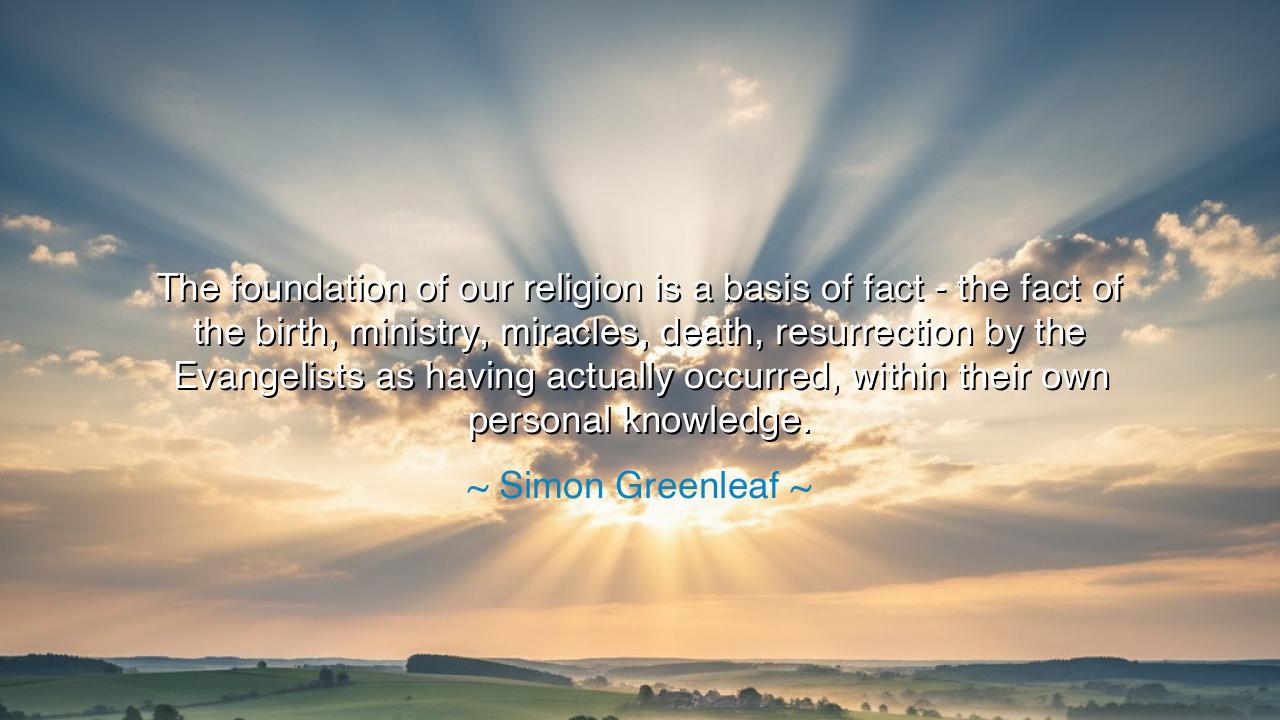
The foundation of our religion is a basis of fact - the fact of
The foundation of our religion is a basis of fact - the fact of the birth, ministry, miracles, death, resurrection by the Evangelists as having actually occurred, within their own personal knowledge.






The words of Simon Greenleaf—“The foundation of our religion is a basis of fact—the fact of the birth, ministry, miracles, death, resurrection by the Evangelists as having actually occurred, within their own personal knowledge”—are a declaration not only of faith but of reason. They were spoken by a man trained in the strict discipline of law, a scholar of evidence and testimony. Greenleaf, one of the founders of Harvard Law School and author of The Treatise on the Law of Evidence, applied his jurist’s eye to the Gospels and found in them the same structure of credibility that sustains justice in a court of law. His words remind us that truth and faith need not be adversaries, for faith, when grounded in truth, is not mere belief—it is conviction born of reason.
In this reflection, Greenleaf proclaims that Christianity is built not upon myth, but upon history. He speaks of “facts”—events that took place in time, witnessed by real men and women, and preserved not as legends but as testimonies. The birth of Christ, His ministry among the people, His miracles, His death, and His resurrection—these, Greenleaf insists, are not symbolic inventions but recorded realities, attested to by those who claimed to have seen and touched them. His argument follows the discipline of law: witnesses must be credible, evidence must be consistent, and testimony must stand the test of scrutiny. By this measure, he found the Gospels reliable—not as poetry, but as history sanctified by divine purpose.
Greenleaf’s conviction was not born of blind faith but of intellectual pursuit. As a legal scholar, he once doubted the supernatural claims of Scripture. Yet when he applied his own standards of cross-examination to the New Testament, he concluded that the witnesses—the Evangelists—spoke not from fantasy, but from experience. Just as a lawyer builds a case from testimony and corroboration, Greenleaf saw in the Gospels the integrity of truth-tellers who were willing to die rather than deny what they had seen. In this, he found that faith and reason converge, each strengthening the other. His quote, then, is not the cry of a zealot but the judgment of a rational man who found belief where once he found only skepticism.
Through history, others have walked this same path of reason leading to faith. Blaise Pascal, the French mathematician and philosopher, likewise declared that faith is not contrary to reason, but beyond it—like a mountain that begins where human logic ends. C.S. Lewis, once an atheist scholar, came to believe not because he abandoned reason, but because reason itself compelled him toward the divine. Greenleaf belongs to this lineage of thinkers who understood that truth must withstand inquiry, and that the divine, if it is real, must bear the weight of evidence. For truth fears no question, and faith, when genuine, grows stronger under examination.
The “Evangelists”, as Greenleaf names them, are the foundation of this reasoning. These were not distant mythmakers but men who walked beside Christ, heard His voice, and witnessed His deeds. Their writings bear the hallmarks of human observation—details, diversity, even differences that, rather than weaken the record, strengthen its authenticity. For the jurist knows that rehearsed witnesses speak in harmony, while truthful ones differ in the small and agree in the great. Greenleaf saw in the Gospel writers neither collusion nor deceit, but conviction. He found not the invention of a story, but the preservation of truth, carried through persecution and sealed with martyrdom.
The lesson of Greenleaf’s reflection reaches beyond religion—it is a call to all seekers of truth. Faith without reason becomes superstition, but reason without faith becomes desolation. The wise man does not reject the invisible simply because it lies beyond the microscope; nor does he accept the unseen without the discipline of thought. To live well is to balance both—to pursue knowledge, but to remember that knowledge alone cannot explain love, beauty, conscience, or hope. In Greenleaf’s words, “inner knowledge” and “outer fact” find harmony, revealing that truth is not only observed but experienced.
So let this teaching endure: when the world tells you that faith and reason are enemies, remember Simon Greenleaf. Approach your questions not with fear, but with integrity. Test what you believe; examine it as a scholar would, as a seeker of truth should. For if what you hold is true, it will endure the flame of inquiry. And if it is false, better to let it burn than to live in illusion. Greenleaf’s wisdom reminds us that the foundation of all belief—religious or otherwise—must rest not on emotion alone, but on fact, reason, and the courage to seek truth wherever it leads. In this union of mind and spirit lies not only knowledge, but faith made unbreakable.






AAdministratorAdministrator
Welcome, honored guests. Please leave a comment, we will respond soon